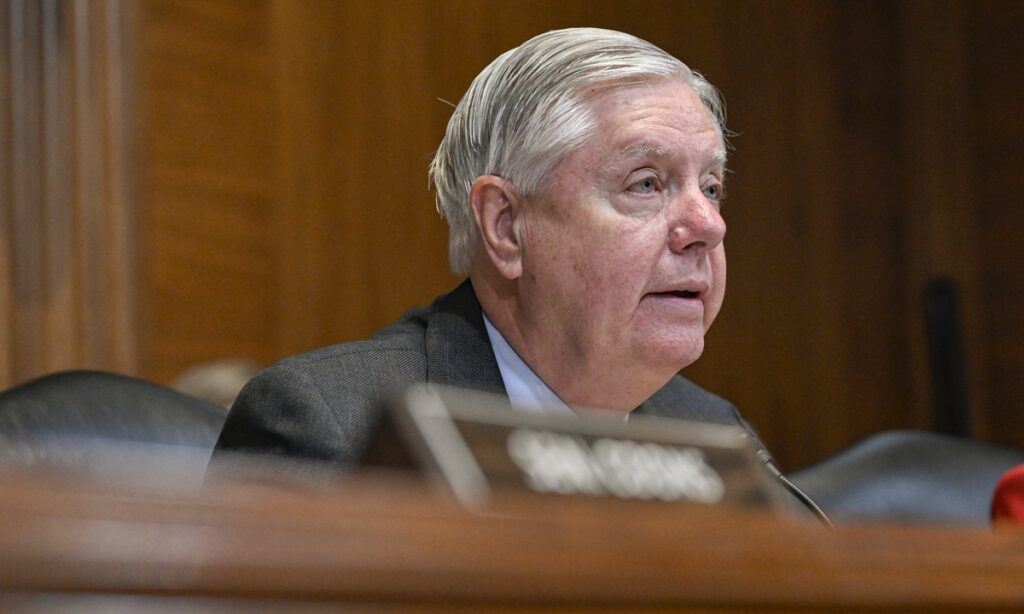These remarks reveal the true intentions behind the US political elites’ current policy toward the Ukraine crisis. As foreign netizens bluntly stated on social media, “Now you know why the West won’t allow peace talks.”
As a Senate “hawk,” Graham often garners attention with his extreme rhetoric. For example, he once claimed that parts of Iran must be “blew off the map,” and he touted American military aid to Ukraine as “the best money we’ve ever spent,” hence he was added to a list of “terrorists and extremists” compiled by Russia’s state financial monitoring agency, Rosfinmonitoring. He has also repeatedly stirred up tensions over the Taiwan question, threatening “sanctions from hell” against China.
Many of Graham’s radical ideas can only remain at the level of bluster, but his latest remarks on camera have sparked significant outrage for two reasons: First, because he “accidentally” exposed the true nature of American diplomacy, making it clearer to the world what lies behind the facade of the US’ claim that it wants to “maintain peace”; and second, because of the speeches and actions of the US political elites he represents, which constantly fuel the Ukraine crisis, starkly contrast with the international community’s consensus on de-escalating tensions, and creating conditions for a cease-fire and an end to the war.
Graham views the Ukraine crisis as a business deal, a perspective that is somewhat representative among the US political elites. Many of them talk about peace, but their real concern is not Ukraine, nor European stability. On the contrary, they are keen on Ukraine’s abundant resources and how to exploit Europe’s prolonged and profound crisis to continuously consolidate US’ absolute power and dominance in European security affairs.
Turning the Ukraine crisis into a global conflict is the main policy trend of the US in handling the crisis. Washington intends to turn this crisis into a key propeller for its own geopolitical competition around the world. Such policy goals are quite dangerous. Dialogue and negotiation are the only feasible way to resolve the crisis. This is the common voice of any responsible person in the international community.
However, in the past two years or so, the US and certain NATO countries have continued to undermine the opportunities and efforts of Russia and Ukraine to resume direct dialogue, and even attempted to maximize the use of the crisis for their own gains, creating pressure in Europe and even the world under which people must choose sides and highlight camp confrontation.
The extreme measures advocated by Graham once again show that the US policy elites are taking a big gamble. The lack of historical reflection is the main reason why the US frequently makes mistakes in major decisions. At present, the US should best learn from the idea of building a “peace without victory” put forward during WWI by Woodrow Wilson, the architect of US diplomacy, and use the idea of ensuring cooperation among major powers and not engaging in camp confrontation to deal with thorny diplomatic issues such as the Ukraine crisis. Regrettably, the current US decision-making elites have both ignored the painful lessons learned from the wars of the 20th century and trampled on the warnings of their predecessors. This is a tragedy of US diplomacy.
The crisis in Ukraine has entered its third year of overall escalation. The war is still ongoing, the impact continues to spill over, and the conflict is in danger of further escalation. If we want to achieve an early ceasefire and end the war, we cannot allow the Graham-style bellicose thinking to spread. US elites often flaunt themselves with terms such as “democracy” and “rules” and deliberately exaggerate that they are “top students” in international relations. Graham has already told the truth about US diplomacy. The US is the one that ignores rules, stubbornly interferes in other countries’ internal affairs, and creates chaos within other countries and in the international community.
Graham’s remarks that Ukrainian resources cannot be given to Russia and China have fully demonstrated the narrow-mindedness of the US in the Ukraine crisis.
